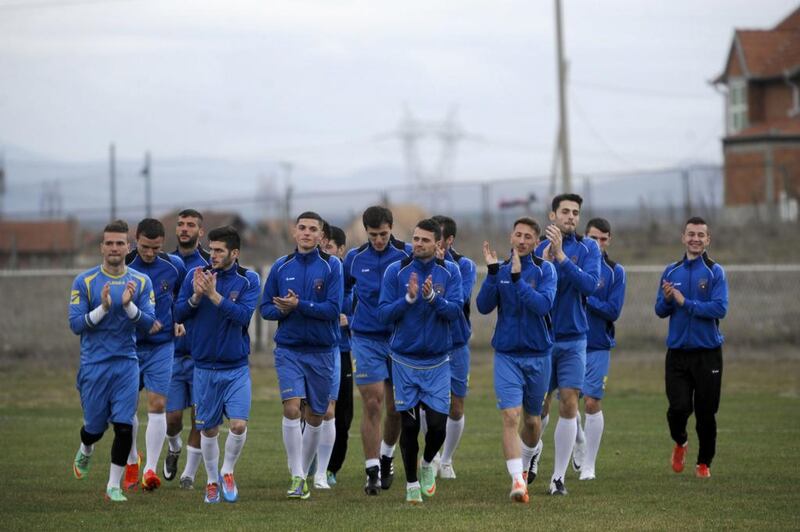There will be no flags or national anthems and it will not be classed as a full international, but Kosovo’s national football team will play its first Fifa-sanctioned friendly match on Wednesday.
Six years after the nascent nation, which is recognised by 23 of the 28 European Union member states and 108 members of the United Nations but not Russia, began their campaign they will play Haiti in the town of Mitrovica, nearly 40 kilometres north of the capital Pristina.
It is the only stadium in the country of 1.7 million that meets Fifa criteria for staging matches.
All 17,000 tickets for the game were snapped up within seven hours of going on sale. Some for the west wing of the stadium were available on the black market for 10 times their original €10 (Dh50.5) price.
Mitrovica is also the only part of Kosovo that a significant number of Serbs still call home.
They are unlikely to attend.
Kosovo, which declared their independence from Serbia in February 2008, is not yet a member of the United Nations and, despite widespread international recognition, cannot therefore join Uefa, European football's governing body, nor Fifa, the world body.
The Kosovan Football Association have long petitioned both groups and received support from distinguished members of its diaspora, including three Switzerland internationals, Xherdan Shaqiri of Bayern Munich, Granit Xhaka of Borussia Moenchengladbach and Valon Behrami of Napoli. They supported Kosovo’s cause, but none of the trio will play tonight.
Fifa does not allow players to perform for two national teams, though Barcelona players have long played for Spain and Catalonia.
It remains a grey area and the Swiss nationals do not want to be further accused of having split loyalties. The Swiss national team has been significantly improved by the Kosovans and they qualified easily for the World Cup finals in Brazil.
“It’s fantastic to be part of this team,” Manchester City forward Bersant Celina, 17, who grew up in Norway, said.
“It couldn’t be better than this,” he said, speaking in English. “I hope to get some playing time so I can show how good I am.”
Manchester United winger Adnan Januzaj is also of Kosovan heritage and could play for the team since most of his family hail from there, but his father turned down the invitation. Kosovo hopes he will change his mind.
The 19 year old, who has not played a full international for any country, also qualifies to play for Serbia, which does not recognise Kosovo and sees it as a historic part of its territory.
He also qualifies for Belgium and Turkey and, in two years, would be able to play for England.
Other Kosovan players represent the countries that took their parents as refugees during the conflict: Norway, Sweden and Finland.
“Kosovo will always keep its doors open for them,” national coach Albert Bunjaki told Reuters during a training session on Monday.
“This is a journey, and we expect others to join us in the future.”
The Kosovan FA is supported by Fadil Vokkri, their greatest player and the only one to make the full Yugoslavia side before the Balkans region was divided into six separate countries following the 1990s wars.
The FA hope Kosovo can become a full Fifa member and enter qualifying for the 2018 World Cup finals in Russia. Fifa have said this is unlikely, but football’s governing bodies have been admitting more members, such as Gibraltar, in spite of objections.
The Serbian FA had long objected to Kosovo’s requests but they acquiesced after negotiations with Fifa last year and tonight’s game can go ahead.
The agreement is that no national symbols can be displayed, but fans may decide otherwise.
Fifa will be watching closely. Their president Sepp Blatter has been supportive and tonight’s game is seen as a landmark, the culmination of six years’ hard work from the Kosovans.
Kosovo have not played a game for two years and then their matches were against local club sides rather than countries.
Bunjaki, has been in charge for five years but they have only played four games in that time.
The country still produces enough naturally talented footballers to produce a good team, though Haiti are ranked 79th in the world and will be a tough test.
Not that the result will matter too much – just being allowed to play the match is an achievement in itself.
sports@thenational.ae
* Additional reporting by Reuters






